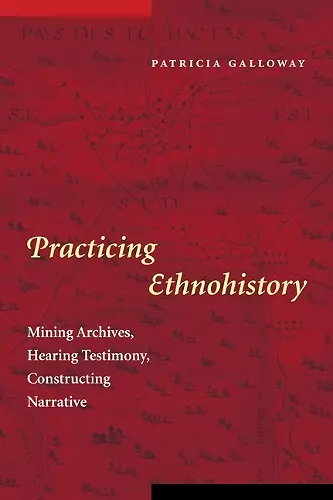Practicing Ethnohistory
Mining Archives, Hearing Testimony, Constructing Narrative
Format:Paperback
Publisher:University of Nebraska Press
Published:1st Nov '06
Currently unavailable, and unfortunately no date known when it will be back

Practicing Ethnohistory is a compendium of twenty-one essays on ethnohistorical historiography. The essays, preceded by a contextualizing introduction, are organized under four topical heads: textual historiography, positive analytic methods using nontextual physical evidence, ethnohistorical synthesis, and the ethical-contextual issues of ethnohistory.
Part 1 focuses on issues such as concerns over the editing of ethnohistorical materials, the limitations of direct historical analogy in archaeology, and the use of archaeological evidence to deconstruct colonialist history when real events are obscured by the bias of historical accounts. Part 2 explores relations across space and time, covering such topics as interpreting change in Choctaw settlement patterns through analysis of narrative evidence for the early French period, GIS applications to historical maps, and the reflection of sociopolitical structure in Choctaw personal names and their historical contexts. Part 3 focuses on communication between Native peoples and European colonists and includes essays on the Mobilian lingua franca in colonial Louisiana, British negotiations with the Choctaw Confederacy in 1765, and eighteenth-century French commissions to Native chiefs. The final part discusses the ethics of ethnohistorical research.
Drawing on years of ethnohistorical research in the southeastern United States, Patricia Galloway has produced an essential reader on the practice of ethnohistory.
“Galloway’s painstaking multidisciplinary research . . . provides case studies that exemplify how to extract a good deal of information out of what often appears to be simple lists of place names or of names and associated roles. . . . What archaeologists, anthropologists, historians, and museum directors do has consequences for indigenous groups and for the society at large. . . . These last two chapters should be required reading for all involved in narrating the history of colonial encounters.”—Journal of Anthropological Research
“This book is an excellent text for use in graduate classes on methodology in a number of disciplines, including ethnohistory, ethnoarchaeology, and Native American studies. . . . The book is ‘a kind of ethno-ethnohistory’ that reinforces the importance of an interdisciplinary approach to the study of the Other. Scholars interested in eighteenth-century Choctaw culture will want this book as part of their libraries.”—Journal of Southern History
ISBN: 9780803271159
Dimensions: unknown
Weight: 612g
456 pages